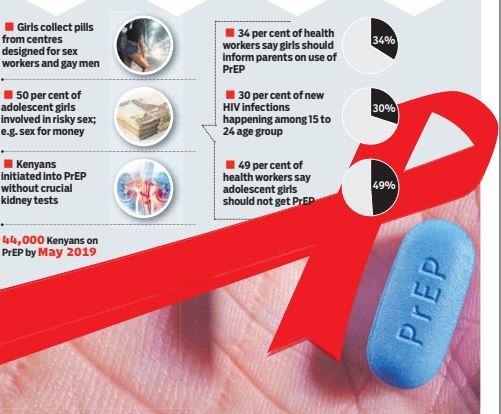
Schoolgirls are increasingly turning to the daily HIV prevention pill as new infections among teenagers reach alarming levels.
A new report on how girls aged between 15 and 19 are taking the daily HIV prevention pill, referred to as PrEP, shows schoolgirls are slowly but increasingly going for the pills.
The report which covered the four-year National Aids and STIs Control Programme (Nascop) project dubbed Jilinde, a government initiative to upscale the use of PrEP showed out of 21,578 clients initiated to the drug, 1,783 or eight per cent were adolescent girls.
Of the adolescents, aged between 15 and 19, the report shows 16 per cent or 285 were school girls. Over half of the adolescent girls, the presentation says are engaged in highly risky behaviour including sex for money, inconsistent condom use and with partners of unknown HIV status.
Unique needs
Many of the girls had accessed PrEP through various ‘drop in points’ provided by the project in various towns across Kenya, according to the report presented on Monday at the 10th International Aids Society (IAS) Conference on HIV Science in Mexico City, Mexico, by among others, Nascop.
These drop in points called DICEs, the report says, are mainly designed to serve sex workers and men who have sex with men.
“Most adolescents accessed PrEP through DICEs but which are not designed to meet the unique needs of adolescent girls,” said the presentation.
Following this conclusion, the authors recommended that efforts be made to restructure the PrEP delivery model for these young girls.
But this was only one of the more than 25 presentations from Kenya at the conference. Most of them promoting the use of PrEP were mainly funded by Gilead Health Sciences, the American firm which manufactures the pills.
A second study presented on Monday by Elizabeth Irungu of the Kenya Medical Research Institute had evaluated the challenges in the scaling up of PrEP in public health facilities since its launch in 2017.
Ms Irungu cited drug stock outs, long waits at hospitals while some facilities were found to be giving out up to three months’ prescriptions against the recommended one month.
She told the conference that despite the high toxicity of the pillsand a requirement that users take kidney tests before initiation and three times annually, this does not happen in Kenya.
“Renal function testing is recommended (but not required) by Kenyan guidelines but due to unavailability of the relevant tests, clients were often initiated on PrEP without such testing,” said Irungu.
PrEP contains Tenofovir as one of the active ingredients that is highly toxic especially to the kidneys.
Impairment
On the same day Irungu was presenting, a study from Ghana in the journal BMC Research Notes reported high kidney impairment among patients using the Tenofovir based HIVmedications.
“The incidence of renal impairment of 1 in every 5 patients with three per cent developing severe renal impairment supports the argument of requesting for laboratory support before initiating the drug,” said the Ghana study.
Almost half of health workers interviewed in Kenya, South Africa and Zimbabwe were reluctant to prescribe PrEP to underage adolescent girls.
This was contained in another presentation at the Mexico conference on Monday by Michele Lanham, of Zimbabwe. It emerged that many health workers in Kenya would rather advise the girls aged between 15 and 17 to abstain from sex other than give them PrEP.
Forty nine per cent of study participants agreed it is better to tell sexually active adolescent girls to abstain from sex rather than give them PrEP.
More than a third, 34 per cent, of the health providers thought adolescent girls should disclose PrEP use to their parents something largely opposed by civil groups.
The study authors recommend more training for health workers to address their reluctance to provide PrEP to young girls.
PrEP advocates argue that the rate of new infections among young girls in Kenya has reached alarming levels.
The Kenya Aids Response Progress Report 2018 shows that out of 44,800 new HIV infections, 14,933 cases – or nearly one-third – were recorded among the 15 to 24 age group.
The report by the National Aids Control Council showed there were 17,700 new HIV infections among both males and females aged between 15 and 24 years.
For every one male aged between 15 and 24 contracting the virus, the report showed there are at least five infected females in the same age group.
 The Standard Group Plc is a multi-media organization with investments in media platforms spanning newspaper print
operations, television, radio broadcasting, digital and online services. The Standard Group is recognized as a
leading multi-media house in Kenya with a key influence in matters of national and international interest.
The Standard Group Plc is a multi-media organization with investments in media platforms spanning newspaper print
operations, television, radio broadcasting, digital and online services. The Standard Group is recognized as a
leading multi-media house in Kenya with a key influence in matters of national and international interest.











